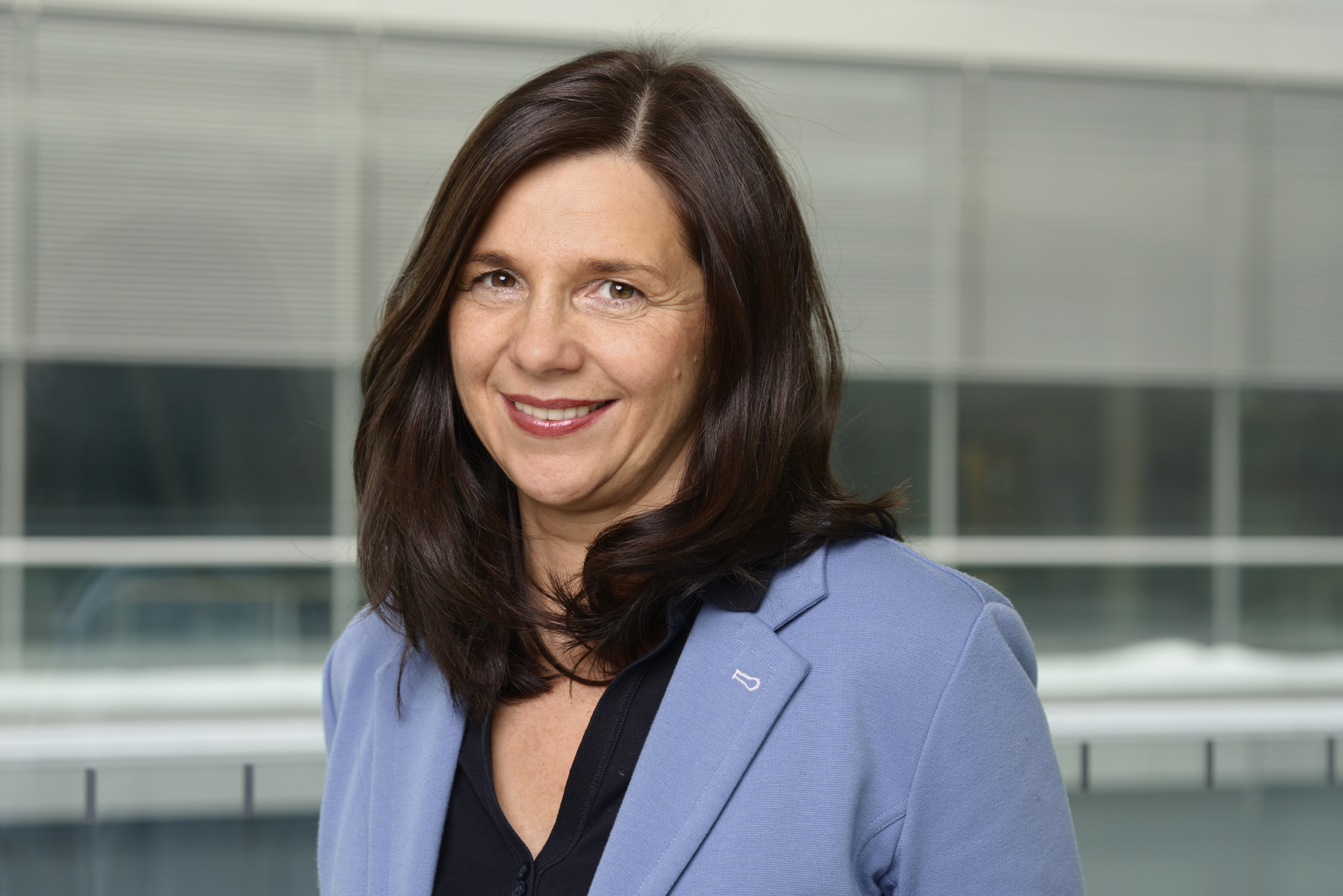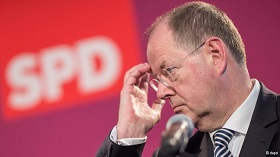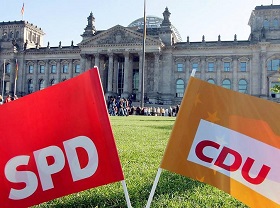Germany: Angela Merkel's New Cabinet
German Labour Minister Ursula von der Leyen,
German Chancellor and leader of the CDU
Angela Merkel and CDU party secretary general
Hermann Groehe celebrate after first exit polls
in the German general election (Bundestagswahl)
at the CDU party headquarters in Berlin
September 22, 2013.
(no votes) |
(0 votes) |
Research Fellow of the Department for European Political Studies at Institute of World Economy and International Relations
On September 22, Germans went to the polls to shape the 18th Bundestag and consequently the new federal government. The ballot has brought the following results: CDU bloc 41.5 percent, SPD 25.7, percent, Left Party 8.6 percent, Green 8.4 percent, and AfD 4.7 percent; and FDP 4.8 percent. Germany retains the 2.5-party system with two leaders, i.e. the people's parties of the CDU/CSU and the SDP. This model is not fading away as some expected after the 2009 elections.
On September 22, Germans went to the polls to shape the 18th Bundestag and consequently the new federal government. The ballot has brought the following results: CDU bloc 41.5 percent, SPD 25.7, percent, Left Party 8.6 percent, Green 8.4 percent, and AfD 4.7 percent; and FDP 4.8 percent.
Although the 2009-2013 election cycle was overshadowed by the global financial and economic crisis, as well as by disturbances in the Eurozone, Mrs. Merkel's government has assertively curbed their disastrous effects on the national economy. The coalition government of the CDU/CSU and the Free Democratic Party (FDP) has, among its other achievements, managed to bring unemployment – a key issue for the German electorate – down to its lowest level in 20 years.
Election Results and their Origin
Whereas the CDU/CSU alliance has been enjoying the trust of the population all the time, the FDP ratings collapsed. In 2009, the Free Democrats managed to obtain their best ever result, 14.6 percent of the vote [1], bringing it back into coalition government with the CDU/CSU after 11 years in opposition. However, in early 2010, the party's rating dropped. Having lost popularity, Guido Westerwelle left the party chairmanship and the vice chancellor position, although retained the post of foreign minister. Back in 2012, their rating was at five-percent [2] , and many Germans doubted the party would pass the five percent Bundestag qualification barrier, especially as in 2011-2012 the FDP lost seats in six Landtags. Nevertheless, many politicians were sure that the liberals would get their five percent at the Bundestag elections and remain in parliament. A sense of solidarity was the key, as CDU and CSU electorates normally vote for candidates from their own parties in single-seat districts first, and then for the FDP in Länder-wide party tickets. This system seems to have worked in May 2012 and January 2013 in the Landtag elections in North Rhine-Westphalia and Lower Saxony. Anyway, neither the CDU/CSU electorate nor their politicians wanted to stay in the Bundestag without their right-of-center allies but eventually the Fedd Democrats failed to reach the Bundestag for the first time in their history.
Established in 2006, the Pirate Party won two percent of the vote in the 2009 Bundestag elections [3]. The party made steady progress and in 2011-2012 managed to break the five-percent threshold at the Landtag elections in four federal Länder. However, in fall 2012, their popularity took a downward turn across Germany, largely due to a series of intra-party scandals that some have explained as the new party’s “growing pains.” In January 2013, the Pirates got just two percent of the vote in the Lower Saxony elections [4], with their Germany-wide rating at a meager three percent in 2013 [5]. All other participating parties that failed to get to the Bundestag gained less than two percent of the vote.
The populist Euroskeptic Aletrnative for Germany Party was set up in February 2013, and in August-September of te same year skyrocketed in popularity, funally gaining 4.7 percent of the vote.
As expected, the CDU/CSU alliance received the bulk of the votes, i.e. 41.5 percent, lacking just five seats for an absolute majority. The reasons for such a victory seem to be as folllows. First, Mrs. Merkel's cabinet has chalked up considerable successes on the socio-economic and European policy fronts. Second, the Chancellor enjoys wide personal approval, her approval ratings are above those of the CDU/CSU and accordingly above those for the CDU/CSU-FDP coalition figures. In fact, 56 percent of Germans are happy about Mrs. Merkel's leadership, while only 52 percent give their approval to the government, and 38 percent to the ruling coalition [6]. In other words, voters would prefer a Merkel government without the Free Democrats.
The CDU/CSU’s main rival is the Socialist Democratic Party (SDP), another people's party that received 25.7 percent of the vote [7]. Their unusually low performance seems to result from the personality of Peer Steinbrueck who was running for chancellorship, while in summer 2013 only 14 percent of Germans believed he could win [8]. During the campaign, Mr. Steinbrueck made several errors, such as saying that the chancellor is underpaid [9]. Besides, Germany's current socio-economic success is a result of the 2005-2009 coalition between the CDU/CSU and SDP, and Gerhardt Schröder’s 1998-2005 red-green government. The CDU/CSU has been handling national problems effectively using the groundwork laid by the SDP and successfully playing the social democratic field.
Neither the Greens not the Left nor the FDP stood any chance of becoming the senior partner in the ruling coalition and put forward their candidate for the chancellor job under a coalition agreement. As a result, their candidates were a fortiori failures. For example, the Free Democrats' nominee was 68-year-old Rainer Brüderle, a Bundestag deputy who was minister for economics and technology for under two years. The Green Party had two candidates, i.e. Katrin Göring-Eckardt and Jürgen Trittin, whereas the Left boasted as many as eight runners.
En Route to the Ruling Coalition
According to pre-election polls, the CDU/CSU alliance could achieve an absolute majority by entering into a coalition with any party that enters parliament. CDU Chairman Angela Merkel, as expected, retains the chancellorship. The only scenario in which the Christian parties could lose government would have been a broad coalition of the SDP, the Greens and the Left. But the SDP Chairman Sigmar Gabriel and Peer Steinbrueck, a candidate for chancellorship, rejected the option. The Social Democratic leaders understand that the election winner and the most liked national leader cannot be in opposition. Besides, a broad coalition will never be stable.
A CDU/CSU - Left coalition is impossible for ideological reasons, so the CDU/CSU leadership can choose between the SDP and the Greens.
A black-green coalition of the CSU/CDU and the Greens remains an unlikely, if fascinating, possibility. As a result of the Greens' ideological evolution, the two share positions on certain global and European issues. However, the German electorate is currently split into the right-of-center and left-of-center segments. The CDU/CSU leaders would not like to ally with the Greens, but some in the Green Party elite would eagerly coalesce with the CDU/CSU. At the same time, there are not many proponents of this course and would be overpowered by the vast majority of the party establishment.
The CDU/CSU's preference would be a grand coalition, i.e. a coalition of people's parties, with the SDP. As a result, the Christian parties would remain the leading political force. In social matters Mrs. Merkel's government is playing the Social Democratic field, which means that this kind of union is quite likely.
However, this scenario could be detrimental to the SDP, the nation's oldest political party, which would be a junior coalition partner and may be marginalized. This has happened twice in German history. In 1966-1969, the balance was different, as SDP leader Willie Brandt was the nation's key figure and became chancellor. The second grand coalition of 2005-2009 ended in disaster when, in 2009, the Social Democrats received about the same vote as the SDP/CSU and more ministerial posts, but Angela Merkel won the chancellorship replacing Gerhardt Schröder whose ratings were in decline. As a result, in 2009 the SDP won just 23 percent of the ballot [10] , a historical record low.
However, since the differences between the CDU/CSU and the SDP are often temporary, the Social Democrats could find entering into a coalition with the powerful Christian grouping acceptable, especially since, in any case, they are bound to find ways of recovering their standing. If they failed to significantly improve their approval figures to the 30 percent level (psychologically essential for German people's parties [11] ) as the key opposition force in 2009-2013, they may well try to do so by joining the Christian parties led by the successful Mrs. Merkel.
Election Lessons
The vote has shown that personality also matters in German politics, which is otherwise known for numerous institutional limitations. Mrs. Merkel is highly respected both in the country and abroad. At the same time, Germany still lacks any other striking, popular politician on the federal stage. In 2009-2011, Karl-Theodor zu Guttenberg of the CDU/CSU, ex-minister for economics and technology and later defense minister, was widely regarded as Mrs. Merkel's successor for the chancellorship, but was destroyed in a doctorate plagiarism scandal that deprived the Christian camp of a potential charismatic leader.
Pundits generally agree that the SDP’s Peer Steinbrueck was not a winning candidate for chancellorship. Since he repeatedly rejected the possibility of joining the Merkel government, if a grand coalition arises, the vice-chancellorship should again go to Frank-Walter Steinmeier of the SDP. But in future, the Social Democrats are likely to bank on North Rhine-Westphalia Minister-President Hannelore Kraft or SDP Chairman Sigmar Gabriel.
The Greens still lack a promising leader, while the liberals are in greater trouble as the unpopular Guido Westerwelle was replaced by the unpopular Philipp Rösler. The Left is the Bundestag's most fractured party, since they are split into pragmatics and fundamentalists that are also divided, and are also split into Western and Eastern blocs. The party has traditionally two co-chairmen that represent old Germany and the new lands.
The election’s outcome was to a great extent streamlined by Mrs. Merkel's efficient socio-economic policies based on the achievements of the 2005-2009 grand coalition. On the European track, Germany's key political forces are united to advance integration. They have embraced the government's proposal setoff establishing the European Stability Mechanism, while the SDP and the Greens have supported her drive toward a European budgetary and political union.
The Future
Germany is not subject to momentary political changes resulting from the formation of a new government, so, Mrs. Merkel's future cabinet is sure to retain continuity.
If a grand coalition of the CDU/CSU and the SDP comes into being, policies on Europe and domestic issues are likely to remain intact. In terms of the transatlantic dimension, the SDP is more critical of the United States than the Christian parties, in particular regarding the issue of American tactical nuclear weapons in Europe and human rights. At the same time, the two never diverge on strategy, i.e. on the need to upgrade and strengthen the transatlantic partnership and elevate Europe's role within this framework.
A hypothetical black-green coalition of the CDU/CSU and the Greens would enhance the human rights component both in the domestic, European, and global tracks.
Attitudes in Berlin toward Russia are also unlikely to see significant change.
Should the SDP join the government as a junior partner, the pragmatic (economic) camp in Germany’s Russia policy is expected to solidify. Led by Mr. Steinmeier of the SDP, the group should concentrate on minimizing the overall negative attitudes toward Vladimir Putin and his policies, although the human rights camp close to Mrs. Merkel will remain strong.
If CDU/CSU opts for a coalition with the Greens, the human rights attacks on Moscow will escalate.
In conclusion, the election outcome saw the CDU/CSU remain the country's leading political force, forcefully driving the SDP to the background. Mrs. Merkel proved that Germans prefer competence to populism, while the electorate remains split into right-of-center and left-of-center elements.
Germany retains the 2.5-party system with two leaders, i.e. the people's parties of the CDU/CSU and the SDP. This model is not fading away as some expected after the 2009 elections.
Germany's Russia policy is sufficiently institutionalized and framed by German principles and interests, consequently hinging on events inside and around Russia rather than on election results.
1. http://www.bundeswahlleiter.de/de/bundestagswahlen/BTW_BUND_09/ergebnisse/
bundesergebnisse/index.html2. See: http://www.wahlrecht.de/umfragen/forsa.htm
3. http://www.bundeswahlleiter.de/de/bundestagswahlen/BTW_BUND_09/ergebnisse/
bundesergebnisse/index.html4. http://www.spiegel.de/politik/deutschland/grafik-wahlergebnisse-der-landtagswahl-niedersachsen-2013-a-876897.html
5. See: http://www.wahlrecht.de/umfragen/forsa.htm
6. Merkel Macht die Meinung // http://www.sueddeutsche.de/politik/rekordwerte-fuer-schwarz-gelb-merkel-macht-die-meinung-1.1736974
7. See: http://www.wahlrecht.de/umfragen/forsa.htm
8. Deutsche Geben Steinbrueck auf // http://www.t-online.de/nachrichten/deutschland/bundestagswahl/id_63875462/peer-steinbrueck-hat-kaum-chancen-gegen-angela-merkel.html
9. See: SDP und das Kanzlergehalt // http://www.spiegel.de/politik/deutschland/steinbrueck-verteidigt-aeusserungen-zu-kanzlergehalt-a-875961.html
10. http://www.bundeswahlleiter.de/de/bundestagswahlen/BTW_BUND_09/ergebnisse/
bundesergebnisse/index.html11. Except for 1949, 1953 and 2009, the SDP received over 30 percent of the vote, while the CDU/CSU has always gained more, which makes the figure a traditional threshold for the people's parties.
(no votes) |
(0 votes) |







